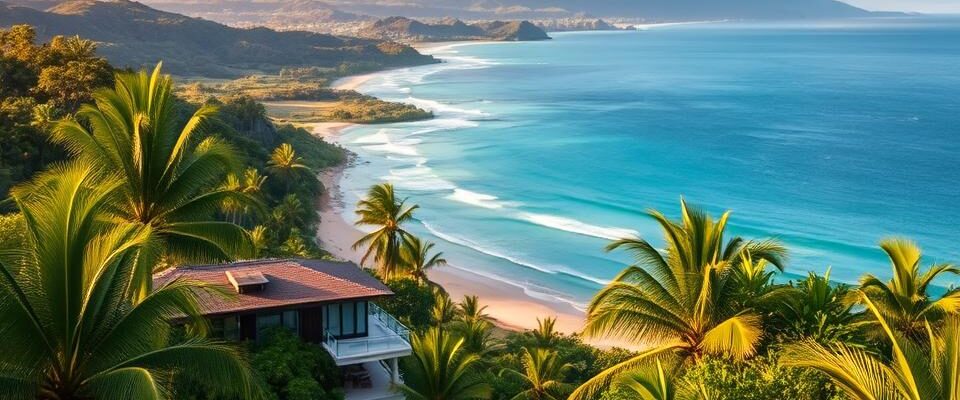Your Property Buying Guide in Costa Rica – We Simplify
At Gap Real Estate, we simplify the process of buying, selling, or investing in Costa Rica. With over two decades of coast-to-coast experience, we deliver seamless transactions through expert guidance and clear communication.
Costa Rica has been a popular destination for expats and investors due to its stable political environment, affordable healthcare, and year-round temperate climate. Whether you’re looking for a vacation home, retirement property, or investment opportunity, our comprehensive guide will walk you through the legal considerations, property types, and essential steps to ensure a smooth buying experience.
We’ll explore the complete process of purchasing property, from understanding the market to finalizing your transaction. With our 20+ years of expertise across Costa Rica, we provide the knowledge and support needed to navigate the local real estate landscape confidently.
Understanding the Costa Rican Real Estate Market
The allure of Costa Rica’s tropical lifestyle and stable political environment continues to draw foreign investors to its real estate market. Costa Rica offers a unique combination of natural beauty, political stability, and investor-friendly property laws that attract foreigners.
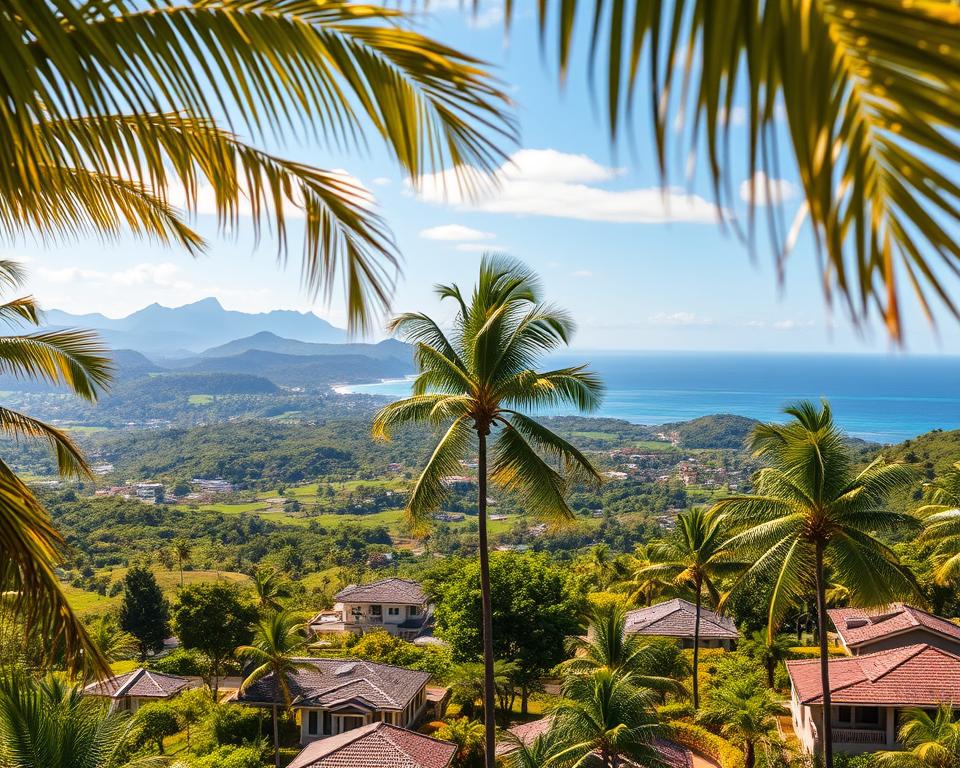
Why Costa Rica Continues to Attract Foreign Buyers
Costa Rica’s popularity among international property buyers stems from its exceptional lifestyle offerings and economic opportunities. The country provides a tropical lifestyle with warm weather throughout the year, rich biodiversity, and scenic environments. We see a significant interest from North American and European buyers due to the country’s affordable healthcare, strong infrastructure, and high quality of life.
Current Market Trends and Opportunities
The current market trends in Costa Rica show a growing interest in sustainable properties, remote work-friendly homes, and properties with rental income potential. Different regions offer varying investment opportunities, from the booming coastal markets of Guanacaste to the established Central Valley communities. Property values have shown steady appreciation in popular areas, making Costa Rica a sound investment opportunity. For more information on investing in Costa Rica’s real estate, visit Gap Real Estate.
- The country has seen a 30% increase in foreign investment in real estate over the past three years.
- Understanding regional market differences is crucial as prices, demand, and growth potential vary significantly across the country.
- Costa Rica is considered one of the safest places to buy property in Latin America.
Legal Rights for Foreign Property Buyers in Costa Rica
When considering purchasing property in Costa Rica, it’s essential to understand the legal rights afforded to foreign buyers. Costa Rica offers a welcoming environment for foreigners looking to invest in real estate.
Equal Ownership Rights for Foreigners
Costa Rica provides equal property ownership rights to foreigners and citizens alike. This means that non-residents can purchase property with full fee simple title, just like locals. Foreign buyers can even purchase property on a tourist visa without needing to apply for residency or citizenship.
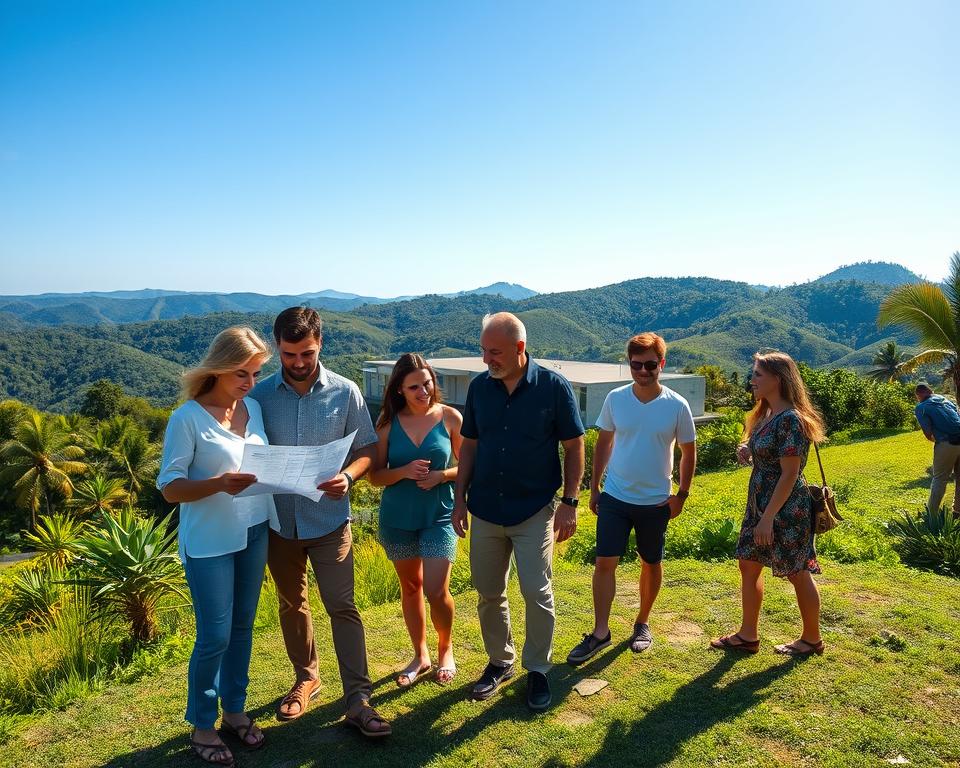
Understanding Maritime Zone Regulations
The Maritime Zone, which extends 200 meters from the high tide mark, has special regulations. While the first 50 meters is public land that cannot be owned, the next 150 meters has restrictions on foreign ownership. Foreigners can own property in this zone through a Costa Rican corporation with at least 51% local ownership. Understanding these regulations is crucial for beachfront property investments.
Types of Properties Available in Costa Rica
Costa Rica is renowned for its diverse range of properties, catering to various lifestyles and investment goals. The country’s varied landscapes and climates offer a broad spectrum of options for property buyers.
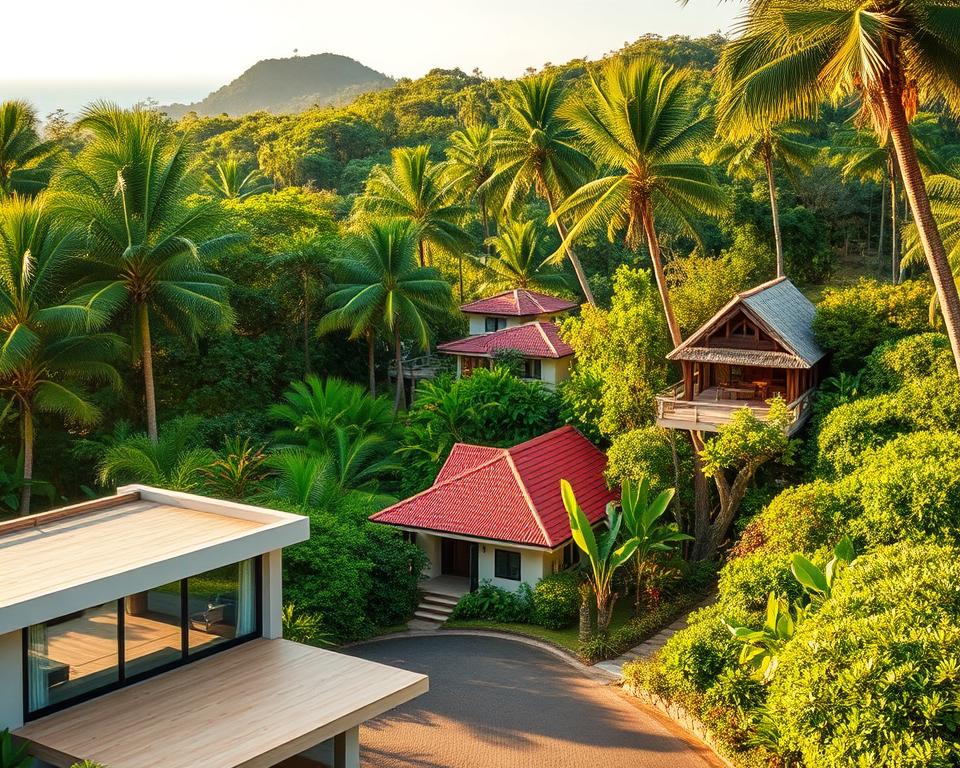
Beachfront and Ocean View Properties
Beachfront properties and ocean-view homes are highly sought after in Costa Rica, particularly in tourist destinations like Guanacaste and the Central Pacific coast. These properties offer not only stunning views but also significant potential for rental income.
Mountain and Jungle Estates
For those seeking tranquility and a connection with nature, mountain and jungle estates are ideal. These properties provide cooler climates and opportunities for eco-friendly living or sustainable development projects.
Urban and Suburban Homes
Urban and suburban homes in areas like San José and surrounding communities offer modern amenities and proximity to services. These homes appeal to buyers looking for a balance of convenience and Costa Rican culture.
Costa Rica’s diverse property types include luxury beachfront villas, affordable mountain retreats, condominiums, and planned communities, as well as agricultural land and development parcels. Each property type comes with unique considerations regarding location, maintenance, and potential return on investment.
- Luxury beachfront villas and ocean-view homes with strong rental potential.
- Mountain and jungle estates ideal for eco-friendly living and sustainable projects.
- Urban and suburban homes offering modern amenities and cultural experiences.
- Condominiums and planned communities with security and lower maintenance.
- Agricultural land and development parcels for commercial or conservation projects.
Step-by-Step Property Buying Guide in Costa Rica
To navigate the Costa Rican real estate market effectively, it’s essential to understand the step-by-step buying process. We will guide you through finding your ideal property, making an offer, and completing due diligence.
Finding Your Ideal Property
Identifying your ideal location and property type is the first step in the property buying process in Costa Rica. We recommend working with a reputable real estate agent who can provide valuable insights into the local market and help you find available properties that match your lifestyle needs and investment goals.
Making an Offer and Securing the Property
Once you’ve found a suitable property, the next step is making an offer and negotiating terms with the seller through your agent. After reaching an agreement on price and conditions, you’ll sign a purchase agreement and typically place a 10% deposit in escrow. This secures the property while due diligence is completed.
Completing Due Diligence
The due diligence period is crucial in the property buying process. Your attorney will conduct a thorough title search, verify property boundaries, check for liens or encumbrances, and review zoning regulations. A physical inspection of the property is also essential to assess its condition and identify any potential issues.
The Role of Real Estate Professionals
Costa Rica’s unique real estate landscape requires knowledgeable professionals to guide buyers through the process. With over 20 years of experience, we have seen firsthand how crucial it is to have the right experts on your side.
Why Working with a Reputable Real Estate Agent is Essential
Working with a reputable real estate agent is vital in Costa Rica due to the absence of a centralized MLS system. A qualified agent provides invaluable insights into different regions, helps navigate cultural differences, and identifies properties that match your specific needs.
- A reputable agent offers local expertise crucial for finding available properties and understanding market values.
- They help navigate the complexities of the Costa Rican real estate market, ensuring a smooth transaction process.
The Importance of a Qualified Real Estate Attorney
A qualified real estate attorney plays a critical role in the transaction process, conducting title searches, reviewing contracts, and ensuring all legal requirements are met. It’s recommended to hire a bilingual attorney who is also a Costa Rican public notary to ensure your interests are well represented.
- Your attorney should conduct thorough due diligence, including title searches and contract reviews.
- Professional representation protects your interests and ensures compliance with local regulations, simplifying the buying process.
With our deep local knowledge and end-to-end support, we simplify the complexities of buying property in Costa Rica. Our experienced team is dedicated to providing you with a seamless and stress-free experience, from initial property search to final transaction.
Legal Considerations When Buying Property
To navigate the complexities of Costa Rican real estate, understanding the legal framework is crucial. Buying property in this beautiful country involves more than just finding the perfect location; it requires a thorough grasp of the legal aspects that govern property transactions.
Title Search and Property Registry Verification
A critical step in the property buying process is conducting a comprehensive title search. This process verifies that the property has clear ownership and is free from any liens, encumbrances, or legal disputes. Our real estate attorney will ensure that the seller has the legal right to transfer the property by conducting a thorough search in the National Registry (Registro Nacional), which maintains official property records.
- A comprehensive title search ensures the property’s ownership is clear.
- The National Registry maintains all official property records.
- Verification of the seller’s legal right to transfer the property is essential.
Understanding Zoning and Building Regulations
Zoning regulations play a significant role in determining what can be built on a property and how it can be used. This is particularly important for development projects or commercial ventures. Additionally, building regulations, which vary by municipality, can affect renovation plans, construction possibilities, or property expansion. Environmental regulations in Costa Rica are also particularly strict, especially for properties near protected areas or within the Maritime Zone.
- Zoning regulations dictate the use and development of the property.
- Building regulations vary by municipality and can impact property plans.
- Environmental regulations are strict, particularly near protected areas.
During the due diligence period, our attorney will verify the legal and physical status of the property, including checking the property registry, land use regulations, building permits, and utilities access. Boundary verification through a professional survey helps prevent future disputes with neighbors and confirms the exact dimensions of the property.
Financial Aspects of Buying Property in Costa Rica
When buying property in Costa Rica, several financial considerations come into play. Understanding these costs is crucial for a smooth transaction.
Closing Costs and Transfer Taxes
Closing costs in Costa Rica typically range from 3.5% to 4% of the property’s value, including legal fees, transfer taxes, and registration fees. The property transfer tax is 1.5% of the registered property value, usually paid by the buyer.
Property Taxes and Luxury Home Tax
Annual property taxes are relatively low at 0.25% of the registered property value. Luxury homes valued over $214,000 are subject to an additional luxury tax, capped at around 0.55% of the property value.
Financing Options for Foreign Buyers
Financing options for foreign buyers are limited. Most international purchasers pay cash or arrange private financing. Some Costa Rican banks offer mortgages to foreigners, requiring substantial documentation and proof of income.
- Closing costs: 3.5-4% of property value
- Property transfer tax: 1.5% of registered property value
- Annual property taxes: 0.25% of registered property value
Buying Property Through a Costa Rican Corporation
Many foreign investors choose to buy property in Costa Rica through a corporation. This approach can simplify the purchase process and offer several benefits.
Benefits of Corporate Ownership
Corporate ownership provides liability protection, simplifies property management, and may offer tax benefits. It is particularly advantageous for properties in the Maritime Zone’s restricted area, where corporate ownership with Costa Rican participation is often mandatory for foreigners.
- Liability protection for property owners
- Simplified management of property-related tasks
- Potential tax advantages
Setting Up a Sociedad Anónima or Sociedad Limitada
To set up a corporation, it’s necessary to work with an attorney to create the legal entity, establish bylaws, and register with the relevant government agencies. Annual maintenance includes filing tax returns and paying a small annual tax.
Common Pitfalls and How to Avoid Them
While Costa Rica offers a relatively safe environment for property investment, certain risks and mistakes can be avoided with proper knowledge. Foreign buyers must be cautious and well-informed to navigate the complexities of Costa Rican real estate.
Due Diligence Mistakes to Avoid
One of the most significant mistakes foreign buyers make is neglecting proper due diligence when purchasing property in Costa Rica. This includes verifying the title is clean, ensuring the property is zoned correctly, and confirming that any structures are legally permitted and built. Inadequate due diligence can lead to costly issues down the line.
- Failing to conduct a comprehensive title search.
- Relying on verbal assurances rather than legal documentation.
- Not verifying zoning and building regulations compliance.
Understanding Squatters’ Rights and Boundary Issues
Costa Rica has laws protecting squatters’ rights, known as “derecho de posesión,” which can complicate property ownership if someone has been living on undeveloped land for an extended period. Boundary disputes are also common, particularly with older properties or in rural areas.
To avoid these issues, it’s crucial to work with qualified professionals, including a reputable real estate agent and a qualified attorney, to ensure a smooth transaction.
Living in Costa Rica After Your Purchase
As you finalize your property ownership in Costa Rica, it’s crucial to consider the lifestyle and legal requirements that come with it. Living in this beautiful country can be a wonderful experience, but there are several factors to take into account to ensure a smooth transition.
Residency Options for Property Owners
You don’t need residency to buy property in Costa Rica, but if you’re planning to stay longer than 180 days, you’ll need to apply for a residency program. Popular options include the Pensionado Visa for retirees, the Rentista Visa for those with independent means, and the Investor Visa, which requires a minimum investment of $150,000 USD, and your property purchase can qualify.
- Property ownership can support your application for various residency programs.
- The Investor Visa is particularly appealing as it allows your property to count towards the investment requirement.
Managing Utilities and Maintenance
Managing your property in Costa Rica involves setting up utilities such as electricity, water, and internet. You can do this in your name or through a corporation. Maintenance is also crucial, especially in tropical climates where humidity and rainfall can affect buildings. Many foreign owners opt for property management services to handle these tasks.
Why Choose Gap Real Estate as Your Trusted Partner
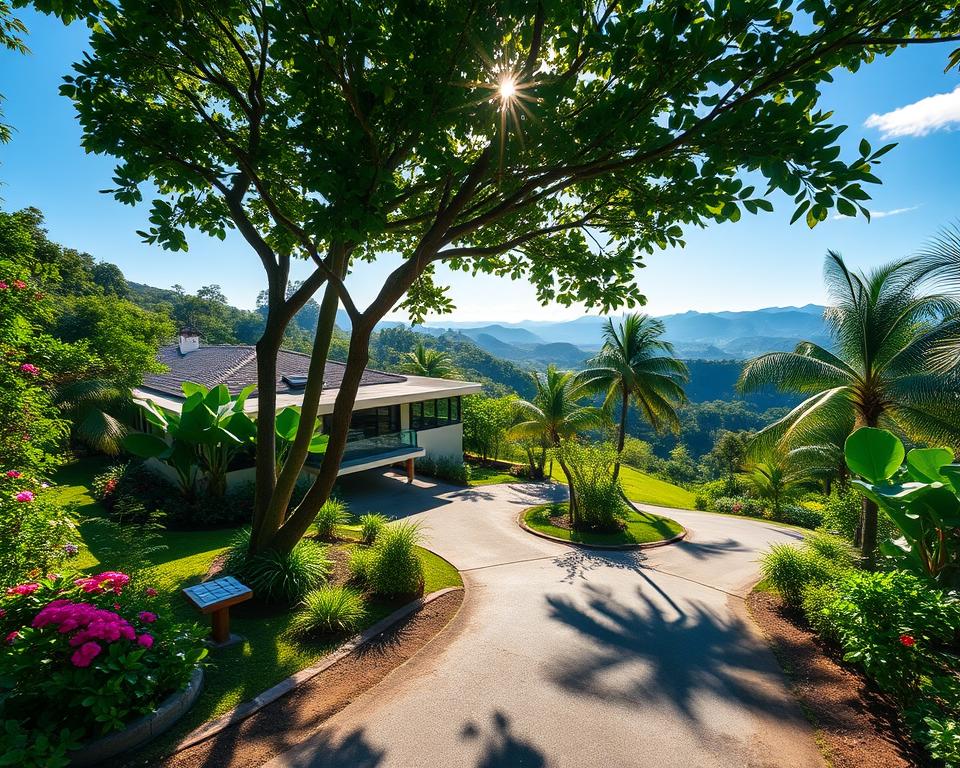
At Gap Real Estate, we pride ourselves on being your trusted partner in Costa Rica’s vibrant real estate market. With over 20 years of coast-to-coast expertise, we simplify buying, selling, or investing in property across Costa Rica. Our team of professionals includes bilingual agents, legal experts, and property specialists who understand both local practices and international buyers’ expectations.
Our 20+ Years of Coast-to-Coast Expertise
Our extensive experience across Costa Rica gives us unique insights into regional market differences, helping you identify the perfect location for your specific needs and investment goals. With deep local knowledge, we navigate Costa Rica’s market confidently, ensuring seamless transactions.
Our End-to-End Support Services
We provide comprehensive support services that go beyond the transaction, including property management, rental assistance, and ongoing advisory services. Our established relationships with attorneys, notaries, and service providers ensure smooth processes and reliable outcomes, prioritizing clear communication and transparency throughout.
Conclusion
Our team at Gap Real Estate is dedicated to simplifying the property buying process in Costa Rica. With our 20+ years of expertise, we provide guidance and support throughout your property buying journey.
Whether you’re looking for a beachfront villa, mountain retreat, or urban condominium, we can help you navigate the market and find the perfect property. Contact us today to begin your Costa Rican property journey with confidence.
Visit www.gaprealestate.com, call/WhatsApp +(506)-4001-6413, or email [email protected] to simplify every step of your property purchase.

